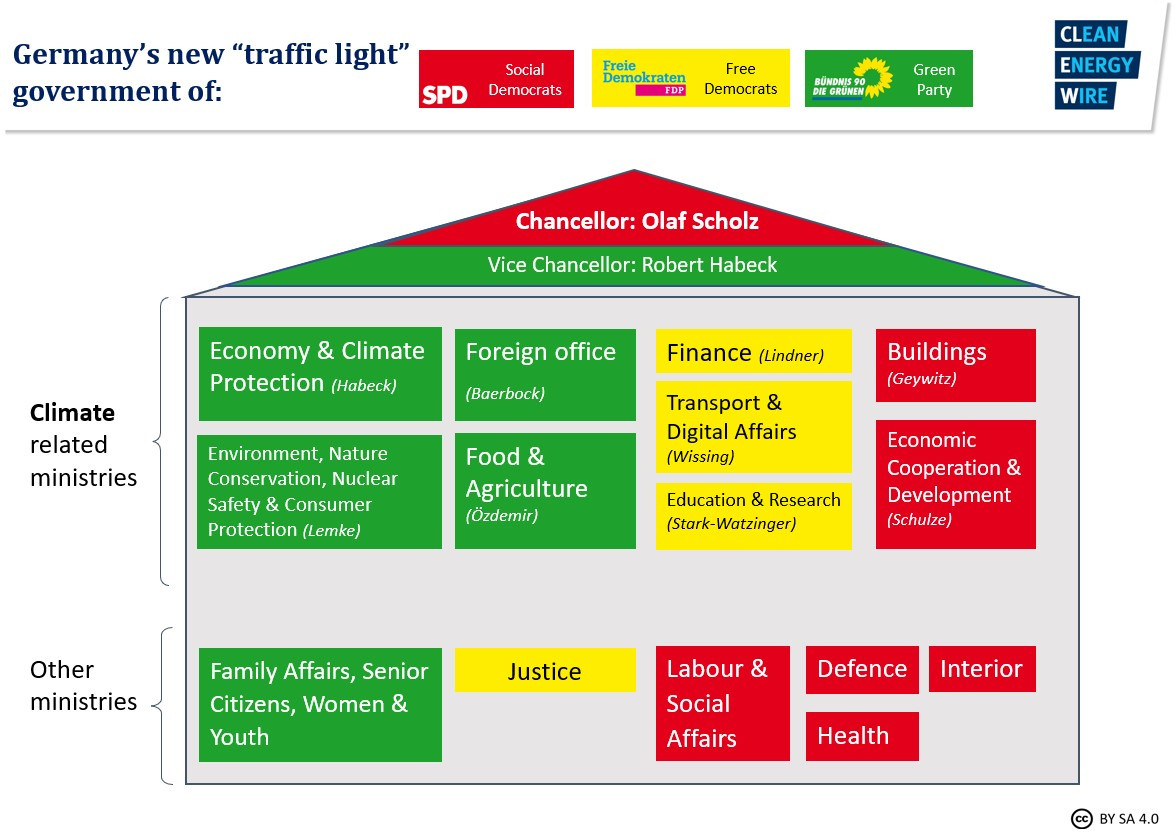The design of Germany's new govt: A climate “super ministry” for the Greens
As is the rule with new governments, the three coalition parties have agreed to slightly change the responsibilities of the ministries. There will be a total of 15 departments (up from 14 in the previous government). The Social Democrats (SPD) who have the most MPs in the federal parliament (Bundestag) and will also hold the chancellorship, will head six other ministries, the Green Party five, and the Free Democrats (FDP) will be in charge of four departments, according to the coalition treaty.
Green Party and FDP have already published their list of names for the respective ministries - which are now pending formal confirmation. In the case of the Greens, this will be done in an online poll on the coalition treaty from 26 November to 6 December. The FDP will hold a party conference on the first weekend in December to confirm the coalition treaty and the Social Democrats have announced that their ministers will be made official at their conference on the same weekend.
Greens to run "super" climate ministry
Each party gets to run departments that will be vital to the shaping of Germany’s future energy and climate policy, with the Green Party receiving the “super ministry” of Economy and Climate Protection, responsible for renewable energies, the power sector, energy networks and the federal climate action law. The Greens had been keen to give the new climate ministry a veto power, to be able to test and reject legislative proposals from other departments that are not in line with Germany’s climate targets and building a sustainable, decarbonised economy. However, in the coalition negotiations with the two other parties, they were not able to win on this subject. Instead, every ministry has to do its own “climate check” on all law proposals, regarding their climate impact and compatibility with the national climate targets. The Greens choice for the Economy and Climate Protection Ministry is Green-Party co-leader Robert Habeck, formerly in charge of a similar ministry in the northern German wind power state of Schleswig-Holstein. Patrick Graichen, head of climate and energy policy think tank Agora Energiewende*, is to become state secretary in the new ministry.
The Greens will also be responsible for the Foreign Office (to be headed by co-leader and chancellor candidate Annalena Baerbock), “Environment, Nature Conservation, Nuclear Safety and Consumer Protection” (Steffi Lemke) as well as for “Food and Agriculture” (Cem Özdemir). One of the Green Party ministers will be the vice chancellor (which is not a separate post but an extra title for one of the ministers).
In the negotiations for the government coalition, the Green Party also received the right to propose the next German EU Commissioner (provided the president of the European Commission isn’t German).
SPD in charge of buildings & development
The SPD will hold a lot fewer climate-related departments. Its Buildings Ministry will have to implement the coalition’s many new approaches on climate-friendly construction, circular economy, insulation refurbishments and renewable heating systems. The SPD is also going to be in charge of the Ministry for Economic Cooperation and Development.
FDP secures finance and transport
The FDP will in in charge of the Finance Ministry – a key department for the energy transition and long fought over by the FDP and the Green Party – where the spending on climate action and industrial policy will be supervised. FDP party leader Christian Lindner has been nominated to head this ministry. The Free Democrats will also lead the Transport Ministry, again a department that the Green Party would have liked to run, and tasked with the major undertaking of making the mobility transition away from fossil-fuelled combustion engines happen. The coalition has set itself the goal of having 15 million fully electric passenger cars on German roads by 2030, and wants to invest heavily in public transport and rail transport. The FDP's executive committee has nominated the party's general secretary Volker Wissing for the role of transport minister.
*Like Clean Energy Wire, Agora Energiewende is funded by Stiftung Mercator and the European Climate Foundation.


